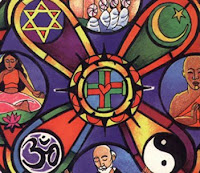 As one of the members of the building staff began to reflect on this week’s Gospel reading, I grew uneasy. It was Wednesday night, and we were meeting with her co-RA and the other hall minister to break open the week’s readings. She talked about relaxing into the image of Jesus as the shepherd, what a welcoming image it is to her. I rarely feel comfortable raising questions that challenge the direction of conversation, especially about an idea as lovely and inviting as Jesus the Shepherd, but something about the last four lines of the reading compelled me to do it, anyway.
As one of the members of the building staff began to reflect on this week’s Gospel reading, I grew uneasy. It was Wednesday night, and we were meeting with her co-RA and the other hall minister to break open the week’s readings. She talked about relaxing into the image of Jesus as the shepherd, what a welcoming image it is to her. I rarely feel comfortable raising questions that challenge the direction of conversation, especially about an idea as lovely and inviting as Jesus the Shepherd, but something about the last four lines of the reading compelled me to do it, anyway.I love those images that you’re raising, I started, somewhat shakily. You can just sort of melt into them, absolutely. But they stand in such stark contrast to the exclusivist tone of the end of the reading. “I am the gate. Whoever enters through me will be saved…” It just doesn’t fit with my understanding of who Jesus is and what his ministry seems to be about. What happened to the spirit of radical welcome that he practiced with Gentiles and Jews alike, men and women, sinner and saint, clean and unclean? Call me old-fashioned, but the spirit of Vatican II (and Jesuit theologian Karl Rahner, if we want to get technical) that embraces the anonymous Christian, the one whose goodness in practice acknowledges the goodness of Jesus, regardless of the religion she calls home, is important to my understanding of what Jesus is ultimately about.
We talked a little longer, coming to few conclusions, but I’m grateful for the discussion that ensued. We were in it for those few minutes, engaging in the kind of dialogue—free of judgment, full of mutual respect—that is so important to our vitality as a Church community.
Looking back on this week, I’m realizing that what bothered me most about our initial approach to the reading is that it didn’t leave enough room for the Holy Spirit. I believe that Scripture is alive and always able to teach us something new, but we have to have hearts open enough to hear what the Spirit is saying.
Would Jesus really preach discrimination between those who claim him as Savior and those who honor him as prophet or respect his moral teachings? As my spiritual director likes to say, authentic love leads to deeper freedom. Does the love that Jesus has for us limit our response to that love to a sort of religious multiple-choice with a black-and-white, right-or-wrong answer? Or is that Shepherd’s love expansive enough to work through many cultures, through many religious traditions that preach a similar kind of love that he did? I’m not claiming to have the answer, either, but I look forward to the journey with women and men who are curious about these questions.
peace,
jen



1 comment:
"Truth is truth even if no one believes it, error is error even if everyone believes it."
- Archbishop Fulton Sheen
Post a Comment